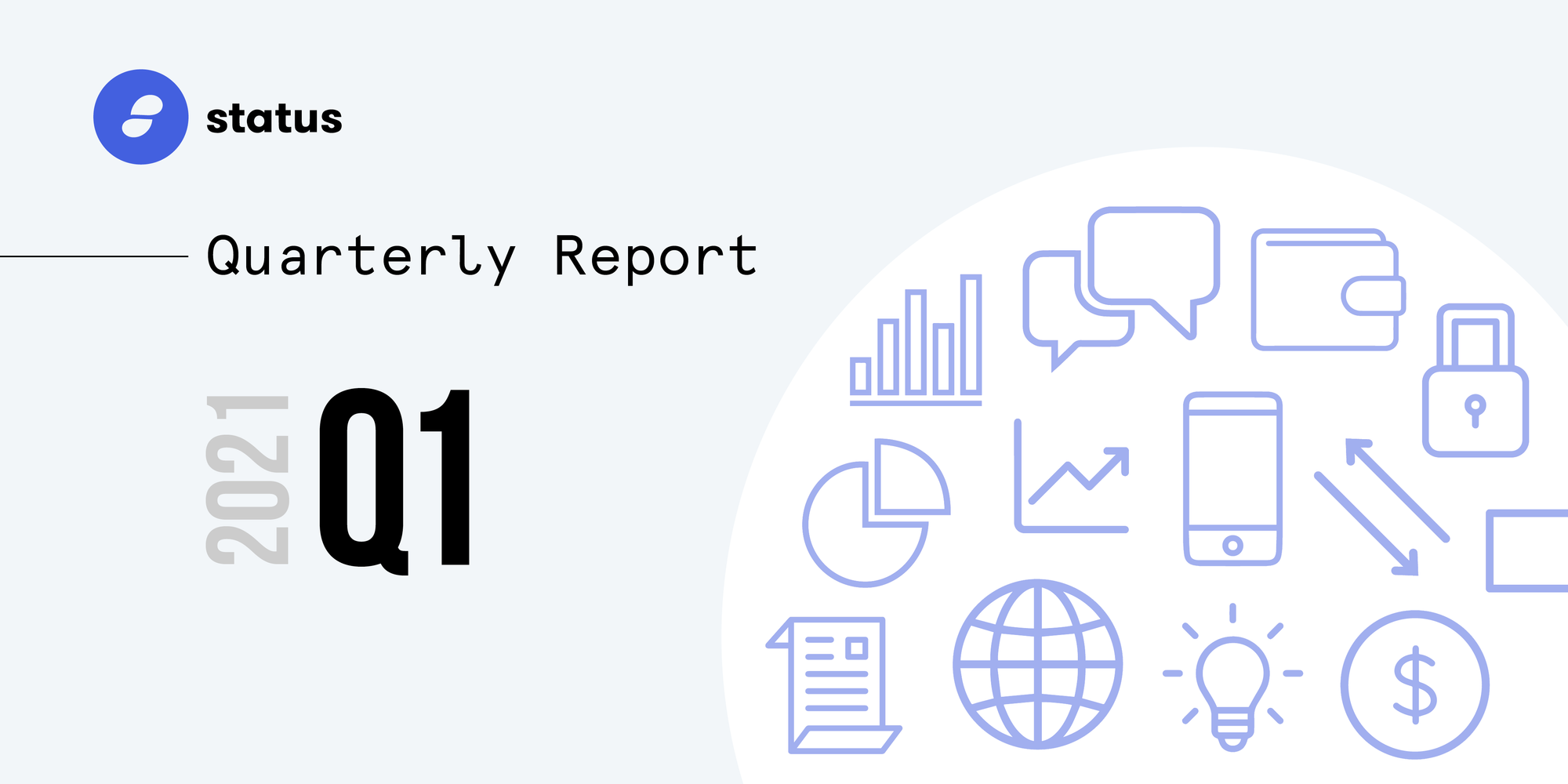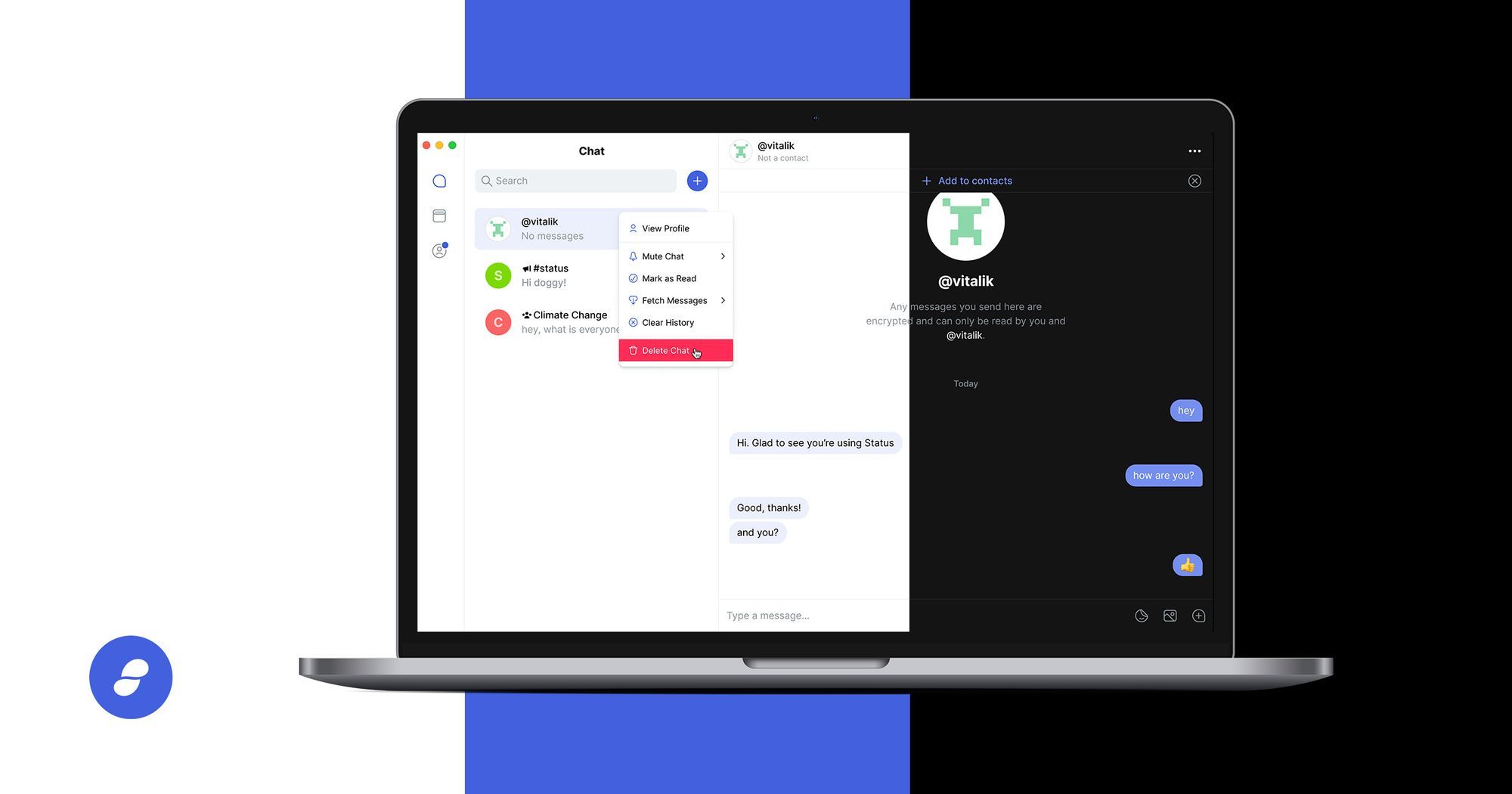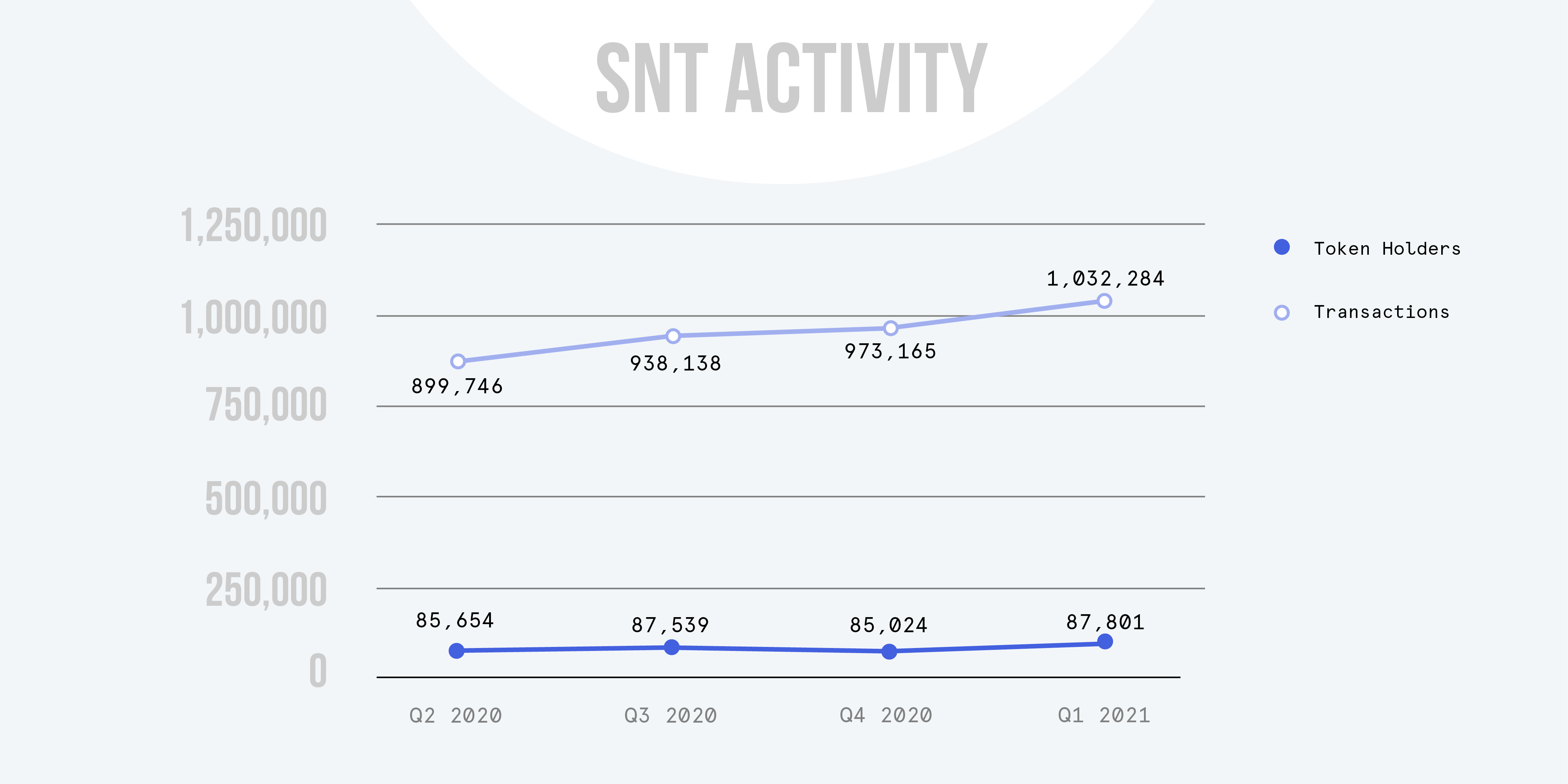The Status Network Quarterly Report - Q1 2021

We’re back with the first Status Network Quarterly Report of 2021 and excited for what the year has in store. This report took a little longer to pull together than usual, but only because there is so much work happening across the entire ecosystem of projects including Status Mobile and Desktop apps, Nimbus, Waku, Keycard, and some exciting new projects kicked off.
As always, the core and community contributors have been focusing on secure communication tools that live up to the Status Principles.
While DeFi and NFT’s made headlines this quarter, a new trend is emerging in crypto social – and one that Status has been building towards since its inception in 2017.
MOBILE APP
Q1 saw some significant improvements to the overall mobile experience with some expected features that bring the app even closer to feature parity with mainstream Web2 communication tools. In Q1 there were also major updates that bring Keycard and the world of Web3 seamlessly into your pocket.
- V1.10 Release - DApp Bookmarks and Profile Images - With this release, Status made significant efforts on features the community has grown to expect. DApp bookmarks make it simple to mark and access favorite DApps. Introducing profile images in a decentralized tech stack was no easy feat, but with this release you could now choose your profile image just as you would in a centralized application.
- V1.11 Release - Improved Keycard Support and More - With Status 1.11, you could now secure an existing account with a Keycard instead of having to create an entirely new account in Status for hardware enforced authorization of transactions and account 2fa. This release also introduced some performance enhancements for better private, group chats and public chats.
- V1.12 Release - Keycard on iOS, Crypto Onramps, and More - This was a momentous moment for Status and the community of security enthusiasts as Keycard became compatible with iOS. Now anyone, whether on Android or iOS, could use a Keycard with Status. Finally, it introduced a more streamlined UX with crypto onramps such as Moonpay, Ramp, LocalCryptos and more.
The core team also began work on some significant improvements to the way communities can organize, connect, and communicate with each other. The team was deep in user research, design iterations, and spacing out architecture requirements for some new community based features to be rolled out later in the year.
DATA AND RETENTION
Q1 marked a significant milestone in the growth and retention of the Status Mobile app with over 830k App installs across the Google Play and App Store.
759,912 New Google Play users were acquired during the time period and there were 492,172 active installs on Android across 190 markets and over 120 languages. On average there were 13,164 Daily Active Users.
DESKTOP APP

Desktop achieved feature parity with the mobile application. The team released Desktop v0.1.0-beta-8 and Desktop v0.1.0-beta-9. The latest releases focus on UI and UX improvements, and the Communities feature.
The product is still in beta but includes core functionality such as:
- P2P messaging with Waku
- Integrated Ethereum wallet - available to toggle in advanced settings
- Web3 DApp Browser - available to toggle in advanced settings
- Status timeline
- Support for Communities - available to toggle in advanced settings
- Suite of UI features such as native OS notifications, link unfurling, profile pictures, file attachments, emojis, mentions, reactions, and many other UI improvements
The Desktop App still hides the wallet and browser tabs by default while still in beta. But with the progress being made by the team, the goal is to conduct an audit and move out of beta in the coming months.
The latest Desktop beta can be downloaded for Mac, Windows, and Linux here.
The Status Network Token (SNT) is the utility token that powers and incentivizes the Status Network.

There are currently 87,801 SNT holders, with 1,032,284 transfers made to date (as of May 7, 2021), and a total supply of 6,805 million SNT. You can see more token metrics here, as well as our own SNT analytics dashboard over at: https://analytics.status.im/.
Many SNT utilities are designed as micro-transactions within the application and network itself. However, with gas prices hitting crazy levels, these transactions became less realistic considering the expensive network fees.
This led the team to further analyze and investigate Layer 2 solutions that are suitable for Status.
Checking in on our SNT utilities live and in development, we have:
Live
- ENS Usernames - An ENS username is a stateofus.eth handle that users can register by locking up 10 SNT, giving them a more human readable username than a contact code. There are currently 5,005 ENS usernames registered by 1,923 owners, with SNT 49,790 locked in the contract. 72 of these ENS names were registered in Q1 2021.
- Dap.ps - A curated list of DApps that relies on a unique economic mechanism to rank information without any centralized authority benefiting. A new Crypto Onramps category was added for seamless access to purchase crypto inside of Status. Tons of new DApps featured on dap.ps such as:
- 1BITPIF - A new exchange to swap, stake, and save
- 2EGGSHOP.ETH - ETH Gang Gangsters' NFT Auction House
- 3Tokensender - Batch send Erc20 or Eth
- Teller - The source code and documentation for this project is live and available for open deployment at teller.exchange. The future of Teller is in the hands of the community.
- Sticker Market - A marketplace for artists and creators to upload and monetize their design work by selling sticker packs directly within the Status app in exchange for SNT. Lots of cool new stickers available for free and for purchase with SNT.
Keycard
Keycard is a secure, contactless hardware wallet, which, when integrated with Status, enables users to:
- Store their private keys offline on the Keycard device
- Add hardware-enforced authorizations to all their transactions, and
- Introduce two-factor authentication to log into their Status account.
As mentioned above, Q1 was a momentous quarter for Keycard. The team added the ability to add an existing account to a Keycard. Previously, owners of a Keycard had to generate a new account in Status and choose `Keycard` as the storage option for your keys.
In March, Keycard was finally integrated with iOS.The iOS integration includes all the same benefits as Android and can be used with iPhone 8 and above.
Learn more about Keycard and get your own at keycard.tech.
Embark
Active work on the Embark Framework has been on pause, as the Embark team has been focused on building the Status Desktop app, as well as integrating Embark with Status, so no updates to report for this edition.
Nimbus
With the mainnet launch of the Nimbus client in Q4, the team continued progress on the client and looked to offer a better experience for validators
- Announced The Nimbus Dashboard Challenge to leverage the creativity within the Ethereum community to help figure out what to display in the Nimbus Grafana dashboard to help visualise important real-time metrics concerning your validator and/or beacon node.
- Introduced v1.0.7 release (doppelganger detection) which included some significant performance improvements across the board as well as additional protection against accidental slashings.
- Nimbus v1.0.8 release and a Rocket Pool integration which included improved libp2p scoring, inclusion of next attestation time on every Slot end log message, and a fix to a rare crash triggered when connecting to a web3 provider using a secure web socket.
- Nimbus v1.0.12 release with Prater testnet support. Prater's objective is to ensure that the network remains stable under a higher load than we've seen so far on mainnet
- Article highlighting Nimbus’ latest efficiency gains
Of particular note, it looks like Nimbus is becoming the client of choice among Rocket Pool users. This is a huge philosophical win for us, since we believe that trustless staking pools, like Rocket Pool, are absolutely key to ensuring Ethereum's future as an unbreakable and censorship-resistant system.
Stimbus (nim-status)
Stimbus is a project that implements the current backend library status-go in the NIM language, with the goal of bringing closer integration with the Nimbus and Vac projects and bringing Waku v2 into the mobile and desktop app.
The team implemented several status-go APIs and functionality, some examples include Status Accounts, Contacts, Mailserver, Usernames, Identicons, Chat and Messages (and related features), Contact Management, Wallet accounts, tokens, transactions, dapp permissions, web3 provider, and other functionality needed such as nim-sqlcipher, protobuffers. Also work done on NIM's concurrency model, as well as the NIX integration to be able to integrate with status-go and status-react.
The approach of the project was adjusted to speed up integration of waku v2 – an implementation has been done in go (go-waku). The next steps are to create a bridge and do some initial testing with branches of desktop and mobile using this status-go branch. Nim-status now continues as a replacement for geth but this time as a pure nim implementation without trying to be a hybrid with status-go. It will reuse most of the code done previously that implements a lot of the required functionality. To speed up development the library will be developed with a very simple command line client, and later integrated into desktop/mobile.
Vac
Vac, the team behind the underlying messaging protocol in use by Status, has been heads down working on Waku v2. Waku v2 is a general-purpose private p2p messaging protocol that seeks to address some of the limitations of Waku, such as scalability. A summary of its motivations and goals can be found here.
During Q1 the team grew in size by adding Franck Royer to build out js-waku, a JavaScript implementation of the Waku v2 protocol.
The team also continued to make developments on Waku v2 and how spam protection can be achieved in Waku Relay protocol1 through Rate-Limiting Nullifiers.
Here is a list of some key Waku Updates:
- Nim-waku 0.2 was released in January - https://github.com/status-im/nim-waku/releases/tag/v0.2
- As mentioned above, Franck kicked off work on the js-waku implementation - https://github.com/status-im/js-waku
- The team started work on go-waku implementation - https://github.com/status-im/go-waku
- The team started work on a PoC and spec for SWAP accounting and settlement - https://github.com/vacp2p/research/discussions/61
Lastly, collaboration with the WalletConnect team began with the fine tuning of infrastructure support for Waku v2.
Alpha development of WalletConnect v2.0 protocol is pretty much done 💪
— WalletConnect 📲 (@WalletConnect) March 29, 2021
We are just fine-tuning our infrastructure to support Waku v2.0 messaging 👀
Be ready for Beta! 🎉 pic.twitter.com/vBPz9eOI91
Community and Marketing
Q1 was a busy time for the Status team as they prepare for large scale acquisition efforts with the release of some exciting new features. So the team was heads down strategizing new product launches while at the same time engaging with the growing community.
To mark the all time high of 6.9k active peers in the network, Status held the #statusstrong sweepstake in which community members were asked to join the #statusstrong Status public channel, react to a post, and enter to win 50 DAI. The community came out and showed how active they can be.
Security Lead Corey Petty was a driving force in the security community as he outlined what it takes to run a successful security audit. The outline is a cornerstone of the Kernel incubator Security track which is now a permanent fixture of the program. Through our involvement with initiatives like Kernel, Status continues to plays a key part in enabling and supporting the growth of the web3 ecosystem and welcoming newcomers into the community.
In an effort to further articulate strong privacy guarantees of Status, the team produced the article “Private Messengers: what can they really see?”. The article was one of the best performing across social media.
Let us not forget how the former director of the NSA, Michael Hayden, said:
— Status (@ethstatus) February 16, 2021
"We kill people based on metadata."
Don't just encrypt your messages. Encrypt everything.https://t.co/Vuz3lIaUC4
The community continued to grow with followers across all platforms growing. Our Twitter account alone had over 11k new followers during the quarter.
The narrative for “crypto social” continued to grow across social media and Status took the opportunity to highlight some of the privacy downfalls of major web2 social media platforms. The team started off by highlighting the popular app Clubhouse with this in-depth privacy analysis.
Clubhouse is a privacy catastrophe.
— Status (@ethstatus) March 10, 2021
As we plunge into a digital-first world, our privacy falls with it. Take back your data, and defend yourself with cryptography.https://t.co/luX3hO1sI7
Project financials
For ease of reference, we report our financial data in USD. Cryptocurrency amounts are translated to the rate of the day when the transaction is recognised.
Strategy
To ensure the long term sustainability of Status’ projects, we’ve secured enough fiat funds to ensure a runway for operations of 3+ years.
The assets position in Treasury is as follows:
Total assets in treasury: million USD
- Tier 1 assets (fiat): 42.1 million USD
- Tier 2 assets (crypto): 246.7 million USD
- Tier 3 assets (SNT): 215.8 million USD
- Tier 4 assets (SNT Reserve): 412.3 million USD
Given our assets position, the runway is as follows:
Total runway for Tier 1 and Tier 2 assets: 222 months
- Tier 1: 37 months
- Tier 2: 185 months
- Tier 3: 166 months
- Tier 4: 317 months
For Q1 2021, we were out in force at ETHDenver with four different panels across community, security and identity. Juan David, our Colombia Lead, Simona Pop, Head of Community, Corey Petty and Jarrad Hope each spoke about Status and our work across different key verticals. All videos available here:
Evolution of Community
Global Adoption: Where are we now?
Identity LegosThe Thing with Privacy is…
We also ran over 10 in person and virtual meetups across LATAM, onboarding newcomers onto Status and into the broader ecosystem. Partnerships with AAVE and Pooltogether were established to illustrate the simple access to DeFi via the dApps browser. Our Crypto Atelier meetups are also proving popular as we introduce LATAM artists to the NFT space via Status. Partnering with POAP and various artists in the space, we have been rewarding meetup participation with bespoke NFTs and will continue building on a reward system and potential ambassador recruitment dynamic.
Spring started with a total count of 76 contributors to the project, amongst which some who we hadn’t seen in a while: happy returns to Stefania Chiorboli and Ned Karlovich, and to Pepper Lea after giving birth to her lovely baby! You’ve been missed!

In addition to the returning contributors mentioned above, we’ve been lucky to bring onboard in this first quarter:
- Arthur Koziel to Infrastructure
- Jamie Lokier and Micheal Jordan Hrycaj to Nim
- Franck Royer to js-waku
- Rachel Wilkinson to Finance
- Brian Sztamfater to Core
We also see a valuable team member leave - at least for now - with Dean Eigenmann. We miss his talent and wish him all the best for the future!
We’re planning to support more projects and users, and we’re looking for a number of amazing people that would make excellent additions to our bunch - if you know any, send them our way! Pepper, Stef, and starting shortly Angel and Sabin will be able to point you to the right information about submitting their details and getting appropriately rewarded.
Most importantly, we’re looking for people that can bring in technical leadership and experience with Golang together with embedded systems programming, p2p technologies, designing high-performing distributed systems, and modern cryptography.
Ambassadors
In Q1 2021, we received 58 new ambassadors applications. The current number of Status ambassadors is now at 55, with representation across 32 countries.
Status ambassadors completed 104 tasks from January to March, broken down by category into: events (3), content (61), community building (3), and technical (37).
Some highlights from the program in Q1 2021:
- @Wong submitted 31 pull requests for Status Desktop.
- @Jose made 6 tutorial videos introducing Status for the Spanish community.
- @Malik submitted 6 issues for Status Desktop.
- @Thiago moderated the Status Brazilian community and translated the Q4 2020 quarterly report.
- @Erol translated Google Play and App Store title and description into Turkish.
- @Vladimir translated the v1.10 and v1.11 release blog post into Russian
- @Pieter completed the Status Dutch translation and helped publish the new Dutch translation.
- @Lilsiri represented Status in the virtual concert, ETHGANG.
- @Dominic wrote 3 blog posts introducing Status in Nigerian blockchain communities.
Translations
Our ambassadors and open source contributors helped spread the words of Status by translating Status into their languages. If you want to learn more about the translation campaign, visit translate.status.im.
Status translation
- Support 20 languages
- English, German, Spanish, French, Portuguese, Italian, Russian, Greek, Turkish, Indonesian, Arabic, Filipino, Korean, Japanese, Traditional Chinese, Simplified Chinese, Bengali,Vietnamese, Dutch, and Polish
- 24 contributors translated 25,256 words
Status.im website translation
- Support 17 languages
- English, Spanish, Portuguese, Simplified Chinese, Traditional Chinese, Korean, Japanese, Russian, German, French, Italian, Polish, Greek, Filipino, Malay, Indonesian, and Arabic
- 17 contributors translated 8,147 words
Many thanks to our translation heroes in Q1: Adrian, Pieter, Thiago, Twister, Marco, Kuanghen, Haruki, Nasib, Foeri, Chris, Floyd, and Albed.
2021 is off to a great start for both Status and the crypto industry alike. With the Status Network making great progress across all projects in the ecosystem and seeing some significant growth in the application, 2021 is becoming very important year we hoped it would be.
Nimbus is shaping up to be the most energy-efficient Eth2 client. Waku is steadily progressing into the communication layer for Web3. And Keycard is now available for Android and iOS users alike.
The team now has plans in place to provide the community with some major updates to the flagship product across mobile and Desktop. Strategies are in place, development is underway, and plans for growth and retention are of utmost importance.
Thank you for reading this report. We’re always excited to tell you about the work we do. Here’s hoping that wherever you might be, you’re safe and well. Take care!
- Your friends at Status
Disclaimer / fine print
This report was made for your entertainment, and we’d ask you not to rely on it for any other purposes, e.g. making investment decisions. Just to be super transparent, we want to highlight that:
- Token metrics information is an estimate supplied by a third party, given for illustrative purposes. We have not independently verified or fact checked this data.
- Financial information provided is based on available data as of the date of publication and may be subject to adjustment after release of this report. Numbers have been rounded for ease of presentation.
Thanks for your understanding!



